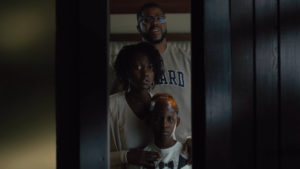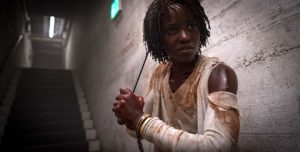Click here for the flashback interview with Lupita Nyong’o for TWELVE YEAR A SLAVE.
There is much to unpack in Jordan Peele’s deeply disturbing, darkly funny horror film, US. As it twists and turns through its doppelganger premise, the scariest part of the action isn’t the fear of home invasion by strangers out for slow, painstaking revenge. It’s the image of an otherwise normal family having a quiet discussion about what to do next in a room strewn with corpses. The adjustment to the new normal of their existence is both a pointed reference to how we have all quickly acclimated to the new normal of our current political landscape, as well as a cautionary reminder of just how thin the veneer of civilization is in all of us. That the acts of violent murder are done in the defense of self and of family remains only a slightly mitigating factor when an otherwise loving mother or ennui-prone teen bludgeons an invader into a pulp, and takes a certain relish in doing it.
The family in question are the Wilsons. They are affluent, contented, and only a little quirky. Son Jason (Evan Alex) sports a monster mask at all times and is much taken with magic tricks. Sister Zora (Shahadi Wright Joseph) is mildly obsessed with the end of the world as we know it. Father Gabe (Winston Duke) is gently humored through his enthusiasm for motor boats and for the beach near their summer place in Santa Cruz. And mother Adelaide (Lupita Nyong’o) has a phobia about that beach, due to an incident there involving squabbling parents, a hall of mirrors, and a mysterious, ragged stranger proclaiming Jeremiah 11:11 on his tattered cardboard sign.
Persuaded by Gabe to bring the kids to the beach, Adelaide begins to see dark coincidences everywhere, including that same stranger from so many years before being taken away in an ambulance. The reunion with old friends Kitty and Josh (Elizabeth Moss, Tim Heidecker) do little to lighten her mood as the other couple trade barbs while quaffing alcohol and exhibiting the worst side of materialism. The underlying tensions are palpable, from Gabe’s resentment of the other couple’s slightly better car to Adelaide’s underwhelming appreciation of the latest work that Kitty has had on her face.

Lupita Nyong’o, Winston Duke, Alex Evans
If the afternoon was less than stellar, the evening is worse, as a mysterious family of four stands silently on the edge of the Wilson’s property, and when politely asked to move along, instead swarm the house and commence terrorizing the Wilsons with calm, implacable determination. Dressed in red coveralls, moving robotically, and bearing the same faces as their captives, the strangers are at once alien and familiar. When Adelaide’s twin, Red, tells her story in a voice unused to speaking its tragedy should make her sympathetic, if only she weren’t carrying a sinister pair of golden shears about which there is no doubt that they are there to wreak havoc. When the answer to Adelaide’s question about who they are elicits the reply “We are Americans”, Peele’s subtext peeks through the horror idiom, but not in a way that is tidy. That would let us all off the hook, and that is not his purpose here.
The idea of twinned bodies with share souls, the one at the mercy of the unwitting other, is a proposition into which much can, and should, be read. The overlay of a stunning tale of horror is the opposite of a distraction. It is the point, and Peele blends horror on many levels with the absurdist humor of a family getting on with the business of survival while also working out a few of their own issues. The broad grin on Zora’s twin as she stalks here is as unnerving in its silence as the way a virtual assistant mishears a command, is satisfyingly droll, cueing a puckishly pertinent song instead of calling the police. The suspense is gripping as people who have done nothing wrong outside of enjoying the privilege of their economic class, become the sacrificial lambs for sins committed in their name. The violence is swift, sometimes funny, always unsettling, and annotated with sound effects that make the experience of hearing the action as terrifying as any visions of blood splattering.

Nyong’o
Nyong’o, who won an Oscar™ for her first feature film role in TWELVE YEARS A SLAVE, is even more formidable here, playing a dual role with such commitment and such passion that the two characters can never be mistaken the one for the other. It’s more than the different costuming and hair. It’s the very essence of each character, one light and one dark, that are sharply defined, converging only in the indomitable will to prevail. When Gabe assures the kids at a particularly fraught moment that mom will take care of things, there is no doubt in anyone’s mind that he is right. It’s only a question of which mom.
US is a thoroughly entertaining philosophical thesis that is clever without being supercilious. Peele’s sense of fun is as much of an imperative as his commentary. The result is a film that becomes more disquieting as it progresses, sweeping us along as willing participants in its musings and shocks.
Your Thoughts?